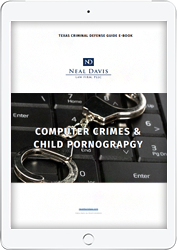
Child Porn Viewing vs. Possession Under Texas & Federal Law
Do you know the legal “gray area” between viewing and possessing child pornography?
You probably know that possessing child porn is a serious sex crime for which you could spend years in prison and pay hefty fines. But did you also know there is a legal gray area between viewing and possessing child pornography?
That distinction may take into account the difference between simply viewing something online and downloading it. Downloading involves actively acquiring material — material which could then be sold or transferred by you. Legally speaking, that would clearly constitute possession, as well as distribution, promotion, and receipt of child child porn — a federal crime under 18 U.S.C. § 2252-C.
Yet even browsing online could constitute a form of possession, since Internet users have such ready access to instant connections which are always available. In other words, you could bookmark a page and thus be able to return to it readily. You wouldn’t technically “possess” it, but you would have instant access — and isn’t that the same as possessing something?
The fact is, in today’s world of portable, high-speed, and constant Internet access to videos, photos, and text, there’s no longer much need to download a digital file to have instant access to it. You can quickly and easily see almost anything without actively downloading it.
As prosecutors commonly ask, how is that different, in practice, from actually owning a download? Either way, you see the material.
Yet there is a legal difference between the affirmative act of downloading, saving or printing image files so that you possess them versus passively saving material on a browser in its hidden cache. Either could be construed as “possession,” though some courts have ruled against browser cache as a form of possession.
How Technology is Changing Child Porn Defense
In short, the gray area of which we speak involves a changing online world — one in which a digital file is becoming an outdated concept in a tableau of instant video streaming or saving materials on a “cloud.” Either way could constitute possession, though only downloading is an affirmative, active process of acquiring a digital file.
In a way, streaming is downloading. You watch something in real-time as it downloads, but simply don’t bother to keep that file when you’re done. But streaming is not, by law, the same as downloading or possessing.
The chief distinction between streaming child pornography and possessing it is this:
If you “live-stream” a video file in real-time, you don’t have the ability to distribute it. Only if you have a JPG or other digital file are you able to distribute it. Therefore, it can be argued that you didn’t “possess” material simply by streaming it, even though you could view it readily at any time.
Also, consider that you may have saved or “bookmarked” links to illegal files such as those featuring child porn, but that doesn’t mean you actually possess such files.
On the other hand, you could share such links with others without physically distributing the material, and that could be argued as constituting distribution of child porn, even though you never physically possessed it. After all, sharing links would have the same result as sharing digital files.
In either case, you’d be providing access to material which could be illegal.
Yet possessing links isn’t the same as possessing actual materials on a digital file. The legal waters are murky when it comes to distinguishing between owning something and simply having quick access to it on the web.
As you can see, a gray area exists between possessing and viewing anything on the Internet. That’s why, if you face a charge of possessing or distributing child porn in Houston, Harris County, Montgomery County or Fort Bend County, you need an experienced child porn defense lawyer to protect your legal rights and argue the case in your favor.
State Child Porn Laws
This brings us to Texas child porn laws.
According to Texas Penal Code 43.26(a)(1), a person commits the offense of possession of child pornography if that person “knowingly or intentionally accesses with intent to view, visual material that visually depicts a child younger than 18 years of age at the time the image of the child was made who is engaging in sexual conduct.”
Note the distinction of when a person “accesses with intent to view” as opposed to actually having physical possession of such material. Under Texas law, simply having access with the intent to view could be construed as possession.
Even so, under Texas law, possession means “actual care, custody, control or management.”
This would seem to preclude simply having ready access to an online video file via live streaming. But again, that may be construed as being in the legal gray area between possessing and simply viewing.
A legal defense against a child porn possession charge in Texas could include arguing that the images were found on a computer’s temporary Internet files, or cache.
Texas courts have previously ruled that sufficient evidence is needed to show that a person had knowledge of such files or possessed them intentionally. Such evidence could include proof that a person actually observed the images in the cache.
Evidence of this behavior could include the defendant’s history of viewing child porn, as well as indications that the defendant exercised control over such images. Expert testimony can reveal whether or not the defendant zoomed in on images, copied them to a hard drive or deliberately deleted them from a computer’s cache files.
Federal Child Porn Laws
Keep in mind that with child porn, you could be charged under Texas child porn laws, federal child porn laws, or both.
Federal laws, like Texas laws, hold that possessing child porn can be a matter of “possessing or knowingly accessing with intent to view any image of child pornography.” Again, that could mean you might be charged with possessing even though you didn’t own a digital file but rather had ready access to one.
Federal laws are more clear when it comes to forbidding the mailing, transporting or transferring of child pornography over a computer, as well as laws forbidding the receiving, reproducing, distributing, promoting or advertising such child pornography.
Texas law also distinguishes between possession and promotion of child porn.
Consult a Knowledgeable Child Porn Defense Lawyer
As you can see, some areas of child porn laws — both Texas and federal — are quite clear. But on the federal and state levels, a gray area remains between actual physical possession and what could constitute possession of such material in a world of Internet clouds, live streaming, and other forms of instant access.
If you need help defending your legal rights in such a case, get a knowledgeable child porn defense lawyer like Neal Davis. We’ve helped protect many Texans from over-reaching laws fueled by hysteria over an alleged sex crime involving a child. Let us help you, too.
Contact us today for a confidential legal review of your case.
Possession of Child Pornography: Texas Criminal Defense
FREE E-BOOKLearn all about the legal process and your legal rights.

